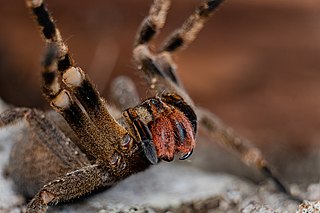
Phoneutria is a genus of spiders in the family Ctenidae of potential medical significance to humans. They are mainly found in northern South America, with one species in Central America. Members of the genus are commonly referred to as Brazilian wandering spiders. Other English names include armed spiders and banana spiders.

Wandering spiders (Ctenidae) are a family of spiders that includes the Brazilian wandering spiders. These spiders have a distinctive longitudinal groove on the top-rear of their oval carapace similar to those of the Amaurobiidae. They are highly defensive and venomous nocturnal hunters. Despite their notoriety for being dangerous, only a few members of Phoneutria have venom known to be hazardous to humans, but the venoms of this family are poorly known, so all larger ctenids should be treated with caution.
Banana spider may refer to:

A spider bite, also known as arachnidism, is an injury resulting from the bite of a spider. The effects of most bites are not serious. Most bites result in mild symptoms around the area of the bite. Rarely they may produce a necrotic skin wound or severe pain.
Phoneutria bahiensis is a species of spiders in the family Ctenidae, found in Brazil. It's known in Brazilian Portuguese as Armadeira da Bahia,.

Phoneutria boliviensis is a species of a medically important spider in the family Ctenidae, found in Central and South America.

Phoneutria fera is a species of spider with medically significant venom in the family Ctenidae found in South America. It is commonly known as the Brazilian wandering spider and the banana spider, although these names are applied to other species in the genus Phoneutria, particularly Phoneutria nigriventer. P. fera tends to spend a larger amount of time in vegetation during the early period of its life and spends more time on the ground once it becomes larger. This is more common in females, since they are usually larger than males. Medical records from within the geographic range of P. fera show bites, have the potential to develop moderate to severe systematic reactions in humans.

Phoneutria nigriventer is a species of medically significant spider in the family Ctenidae, found in South America. Along with other members of the genus, they are often referred to as Brazilian wandering spiders.
Phoneutria reidyi is a species of venomous spiders in the family Ctenidae, found in South America.
Tx2-6 is a toxin found in the venom of the Brazilian wandering spider, Phoneutria nigriventer(Keyserling). It is a peptide of 48 residues, molecular weight 5291.3. This peptide is cleaved from a longer precursor with a signal peptide and a glutamine-rich propeptide. It can cause priapism. Tests on rats indicate that the toxin causes nitric oxide release, and its effect on erection is blocked by the nitric oxide synthase inhibitor L-NAME. However, it fully restored erectile function in rats developing hypertension due to injection of deoxycorticosterone acetate. A study is underway at the Medical College of Georgia looking at possible uses for the chemical in erectile dysfunction medication. Scientists and Gregory Ochs are collaborating on this study.
Phoneutria keyserlingi is a species of spiders in the family Ctenidae, found in Brazil.
Phoneutria pertyi is a species of spiders in the family Ctenidae, found in Brazil.
Phoneutria nigriventer toxin-3 is more commonly referred to as PhTx3.

Cupiennius, known by the common name banana spiders, is a genus of araneomorph spiders in the family Trechaleidae, named by Eugène Simon in 1891. They are found from Mexico to northwestern South America, and on some Caribbean islands. Unlike the dangerously venomous Phoneutria, bites from these spiders typically have only minor effects on humans, and have been compared to a bee sting.
The pathophysiology of a spider bite is due to the effect of its venom. A spider envenomation occurs whenever a spider injects venom into the skin. Not all spider bites inject venom – a dry bite, and the amount of venom injected can vary based on the type of spider and the circumstances of the encounter. The mechanical injury from a spider bite is not a serious concern for humans. Some spider bites do leave a large enough wound that infection may be a concern. However, it is generally the toxicity of spider venom that poses the most risk to human beings; several spiders are known to have venom that can cause injury to humans in the amounts that a spider will typically inject when biting.

Viridasius is a monotypic genus of East African araneomorph spiders in the family Viridasiidae, containing the single species, Viridasius fasciatus. It was first described by Eugène Simon in 1889, and has only been found in Madagascar.
Ctenus captiosus, known generally as the Florida false wolf spider or tropical wolf spider, is a species of wandering spider in the family Ctenidae. It is found in the United States., and is one of two species of Ctenidae occurring in Florida. Little is known about the biology of this species.
PhTx-1 is a toxic fraction isolated from the venom of the Brazilian wandering spider Phoneutria nigriventer.
U7-ctenitoxin-Pn1a (or U7-CNTX-Pn1a for short) is a neurotoxin that blocks TRPV1 channels, and can exhibit analgestic effects. It is naturally found in the venom of Phoneutria nigriventer.
Phoneutria depilata is a species of spider in the family Ctenidae, found in Central America.







